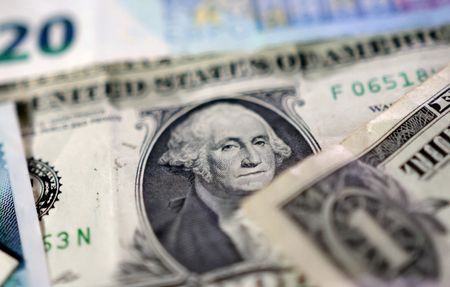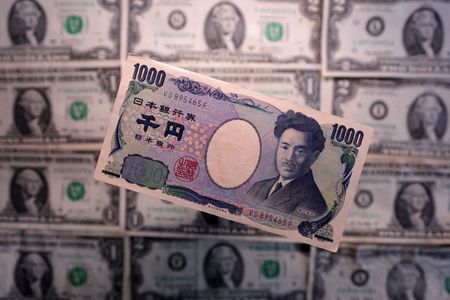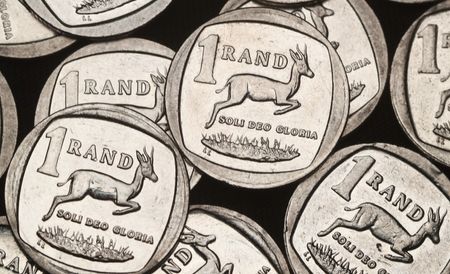By Karen Brettell
NEW YORK (Reuters) -The dollar strengthened on Tuesday as the yen came under pressure from a sharp fall in Japan’s long-dated bond yields, while the greenback was boosted by data improving U.S. consumer confidence.
“It’s very much being driven by global bond markets, and most recently what we’ve seen in Japan,” said Eric Theoret, FX strategist at Scotiabank in Toronto. “Market participants are reading into the fact that the Ministry of Finance sent out a questionnaire to their primary dealers about issuance.”
Bloomberg reported on Tuesday that the Japanese Ministry of Finance sent a questionnaire to market participants regarding issuance and current market issues. Japan will consider trimming issuance of super-long bonds in the wake of recent sharp rises in yields for the notes, two sources told Reuters on Tuesday.
The plan comes amid a recent spike in super-long bond yields to record levels due to dwindling demand from traditional buyers such as life insurers and global market jitters over steadily rising debt levels.
The dollar was last up 1% at 144.28 Japanese yen. The euro fell 0.46% to $1.1335.
The greenback added to gains after data showed U.S. consumer confidence in May was much better than economists had expected.
Data this week will include personal consumption expenditures for April, the Federal Reserve’s preferred inflation measure, on Friday.
Minneapolis Fed President Neel Kashkari on Tuesday called for keeping interest rates steady until there is more clarity on how higher tariffs affect inflation, warning against “looking through” the impact of such supply price shocks.
The euro, meanwhile, was dented by data showing that French inflation fell to its lowest level since December 2020 in May.
U.S. President Donald Trump on Sunday dropped his threat to impose 50% tariffs on European Union imports from next month, which boosted risk appetite on Tuesday.
European Union policymakers have asked the EU’s leading companies and CEOs to swiftly provide detail of their U.S. investment plans, according to two sources familiar with the matter, as Brussels prepares for trade talks with Washington.
Investors are concerned that tariffs will hurt growth and potentially reignite inflation, though traders have become less pessimistic on the U.S. economic outlook since the United States and China earlier this month reached a deal to slash tariffs they had imposed on each other.
Longer-term, the more protectionist stance of the United States is expected to continue to hurt the greenback.
“We’re still in an environment of medium to longer term U.S. dollar weakness,” said Theoret.
European Central Bank President Christine Lagarde said on Monday that the euro could become a viable alternative to the dollar if governments could only strengthen the bloc’s financial and security architecture.
Investors are also watching the passage of a spending and tax bill through the U.S. Congress that is expected to add trillions of dollars of debt.
“Our first take on the House budget is it’s not too bad, but could be better. It will reduce the deficit-to-GDP ratio, though probably not enough to put the budget on a sustainable path,” Chris Low, chief economist at FHN Financial said in a note.
Low noted, however, that “no one is happy” with the bill, with right-wing commentators upset that it didn’t further DOGE spending cuts, while left wing pundits are mainly opposed to the size of cuts to social spending.
U.S. Senate Republicans said on Thursday they will seek substantial changes to the spending bill after it narrowly won approval in the House of Representatives.
Elsewhere the dollar strengthened 0.77% to 0.827 Swiss franc.
Swiss inflation could enter negative territory in the coming months, but this will not necessarily trigger a reaction by the Swiss National Bank, SNB Chairman Martin Schlegel said on Tuesday.
(Reporting by Karen Brettell; Additional reporting by Lucy Raitano in London and Rocky Swift in Tokyo; Editing by Mark Potter, Bernadette Baum and Sandra Maler)








